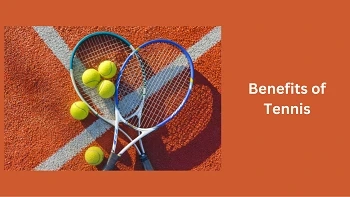Tennis is more than just a game; it's a wholesome sport that offers an array of benefits for children of all ages. As parents, guardians, or educators, introducing tennis to children can be a rewarding experience. Here's why:
1. Physical Fitness and Obesity Prevention
In today's digital age, children are more prone to sedentary lifestyles, leading to potential health risks such as obesity. Tennis provides an engaging solution.
Burns Calories: A game of singles tennis can burn between 400 – 600 calories an hour. This aerobic exercise increases heart rate, improves cardiovascular health, and helps maintain a healthy weight.
Promotes Overall Fitness: The running, swinging, jumping, and reaching involved in tennis promote overall physical fitness. It supports the Chief Medical Officer's recommendation of 60 minutes of exercise per day, helping children develop good exercise habits that last a lifetime.
Versatility: Tennis is accessible to children of all fitness levels. It can be played indoors or outdoors, in a club or a local park, making it a versatile way to keep kids active.
2. Bone Health Support
Tennis is not just about building muscles; it also positively impacts bones.
Increases Peak Bone Mass: Regular tennis play can increase peak bone mass in children, setting the foundation for strong bones later in life.
Prevents Osteoporosis: Engaging in tennis from an early age helps in maintaining bone density, preventing health conditions such as osteoporosis and fractures.
Long-term Benefits: Teaching children tennis promotes a lifelong appreciation for exercise, which is key to maintaining bone health throughout life. It's a fun and rewarding way to invest in their future well-being.
3. Enhancement of Flexibility and Coordination
Tennis is a sport that requires the full cooperation of the body, enhancing flexibility and coordination.
Develops Coordination: Every shot in tennis requires coordination of feet, arms, hands, core, and legs. This helps in improving hand-eye coordination and overall body control.
Increases Flexibility: Greater flexibility gives children a wider range of motion. Tennis coaching can enhance this flexibility, allowing them to move more freely and with ease.
Reduces Injury Risk: Improved posture and balance through tennis can decrease the chance of injury and muscle pain, a critical factor in child development.
4. Mental Health Boost
Tennis offers more than physical benefits; it nurtures mental health as well.
Improves Cognitive Skills: Tennis requires creative thinking, planning, tactical strategizing, and body coordination. These processes boost brain function, improving memory, learning, and social skills.
Enhances Emotional Well-being: The joy of playing tennis can enhance self-esteem, reduce anxiety, and promote a more positive outlook on life. It's not just a game but a therapeutic experience.
Post-Pandemic Recovery: In the wake of stressful times, tennis offers a fun, engaging way to heal. It's a mental tonic for children, building resilience and happiness.
5. Social Development and Friendship
Lastly, tennis is a conduit for social interaction.
Fosters Friendships: Tennis clubs, local parks, or beach games provide opportunities for children to meet new friends and strengthen existing relationships.
Builds Confidence: Engaging in a sport like tennis fosters self-confidence and self-esteem, empowering children in social situations.
Family Bonding: Tennis can be a family activity. Playing together fosters stronger bonds and creates shared memories.
Stress Reduction: The camaraderie and joy of playing tennis with friends can reduce stress and create positive emotional experiences.
For children showing a keen interest in tennis, enrolling them in a tennis academy can be the next crucial step. Tennis academies provide structured coaching with professional trainers who understand the unique needs and potential of each child. They not only teach the technicalities of the game but also instill discipline, teamwork, sportsmanship, and a competitive spirit. The systematic approach of an academy helps children progress steadily, unlocking their potential and maximizing the benefits of the sport. A tennis academy can turn a fun hobby into a lifelong passion or even a professional pursuit, paving the way for future success.
Conclusion
Introducing children to tennis is a multifaceted investment in their well-being. From physical fitness to mental fortitude, from building bone health to fostering friendships, tennis offers a wide array of benefits. As parents or guardians, it's an opportunity to guide children towards a healthy, happy, and well-rounded life.



